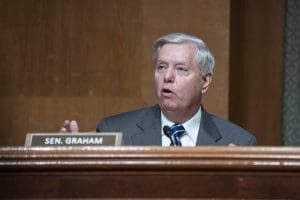GOP senators who refused to fund jobs bill now oppose it over lack of funding
But they refused to allow any tax increases to actually pay for the bipartisan $579 billion investment package.

A group of Senate Republicans is threatening to torpedo the bipartisan infrastructure plan they agreed to last month, citing concerns over its financing. But the same lawmakers refused to allow any tax increases on corporations or wealthy Americans to pay for the investments.
South Carolina Sen. Lindsey Graham, one of 11 Republicans who reached the bipartisan agreement with President Joe Biden in June, told reporters on Monday, “We don’t have enough pay-fors. It’s not so much not supporting the ones we got, it’s just it’s not enough.”
“I don’t think they’re totally locked down,” South Dakota Sen. Mike Rounds, another member of that group, said of the provisions to pay for $579 billion in new infrastructure spending. “I think that’s still a matter for discussion.”
“No. No, no, no. I’m not committed or totally guaranteed on it,” Rounds said of the overall package. “I want to support it, but I’m going to wait and see the final product as well, but I’m hoping that it works.”
A third member of the group, North Carolina Sen. Richard Burr, also indicated he would not yet commit to backing the deal. “Pay-fors are always a function of a little fuzzy math. So we’ll see.”
Sens. Jerry Moran of Kansas and Todd Young of Indiana told CNN on Monday that they are still undecided on whether to vote for their own infrastructure plan.
Because the package would be considered under the Senate’s normal procedures, it would require at least 10 Republican votes to circumvent a minority party filibuster. With five of the 11 GOP backers threatening to bolt, that could spell doom for the agreement.
On June 16, those 11 senators, along with 10 members of the Democratic caucus, agreed on a bipartisan framework for new investment in transportation, broadband, and water system infrastructure.
Days later, Biden and the group agreed to move forward with their plan. They announced that the new spending would be funded “through a combination of closing the tax gap, redirecting unspent emergency relief funds, targeted corporate user fees, and the macroeconomic impact of infrastructure investment.”
The deal was much smaller than Biden’s original proposal, the American Jobs Plan, which called for $2.25 trillion in new investment in transportation, climate, clean energy, broadband, water systems, and caregiving infrastructure. That plan would have been funded by a tax increase on corporations.
But Senate Republicans unanimously opposed any tax increases at all on the wealthy or corporations to pay for infrastructure. Minority Leader Mitch McConnell said this was their “red line.” Some instead suggested a gasoline tax increase, but Biden rejected this as a breach of his campaign promise not to raise taxes on anyone making under $400,000.
Instead, the president and the bipartisan group agreed to expand tax law enforcement, rely on public-private investment partnerships, and use unspent funds from last year’s pandemic relief plans.
Democrats hope to include some climate, clean energy, and caregiving infrastructure, along with investments in child care, free community college, and paid leave, in a separate package, which could be passed through a budget reconciliation process without a single GOP vote.
But some Republicans are trying to block the bipartisan infrastructure package, upset that it would include funding for the IRS to crack down on rich tax evaders.
The plan includes a $40 billion increase in Internal Revenue Service funding to beef up enforcement. The White House predicts that would bring in $140 billion more in revenue already owed to the federal government under current tax law; the nonpartisan Congressional Budget Office estimates it would provide $103 billion more over a decade, more than paying for itself.
Axios reported on July 1 that Texas Sen. Ted Cruz, who has not backed the deal, said, “Throwing billions more taxpayer dollars at the IRS will only hurt Americans struggling to recover after waves of devastating lockdowns. … Instead of increasing funding for the IRS, we should abolish the damn place.”
Senate Republican Conference Chair John Barrasso, who has not endorsed the package, told Axios that an IRS expansion would mean Americans would face “an army of bureaucrats snooping through their bank statements.”
Even Graham cast doubt on those provisions in the deal he had endorsed, saying, “I don’t mind empowering the IRS if it’s a reasonable thing to do. But I mean, how much uncollected taxes can you gather with $40 billion?”
Published with permission of The American Independent Foundation.
Recommended

Biden calls for expanded child tax credit, taxes on wealthy in $7.2 trillion budget plan
President Joe Biden released his budget request for the upcoming fiscal year Monday, calling on Congress to stick to the spending agreement brokered last year and to revamp tax laws so that the “wealthy pay their fair share.”
By Jennifer Shutt, States Newsroom - March 11, 2024
December jobs report: Wages up, hiring steady as job market ends year strong
Friday’s jobs data showed a strong, resilient U.S. labor market with wages outpacing inflation — welcome news for Americans hoping to have more purchasing power in 2024.
By Casey Quinlan - January 05, 2024
Biden’s infrastructure law is boosting Nevada’s economy. Sam Brown opposed it.
The Nevada Republican U.S. Senate hopeful also spoke out against a rail project projected to create thousands of union jobs
By Jesse Valentine - November 15, 2023









































































